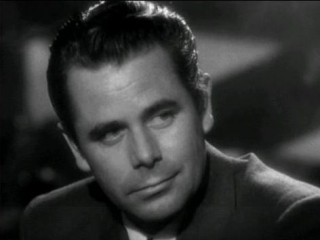
Glenn Ford biography
Date of birth : 1916-05-01
Date of death : 2006-08-30
Birthplace : Quebec City, Quebec, Canada
Nationality : Canadian-American
Category : Arts and Entertainment
Last modified : 2010-04-05
Credited as : American actor, Plunder of the Sun, Pocketful of Miracles
0 votes so far
The son of a Canadian railroad executive, Glenn Ford first toddled on-stage at age four in a community production of Tom Thumb's Wedding. In 1924, Ford's family moved to California, where he was active in high-school theatricals. He landed his first professional theater job as a stage manager in 1934, and, within a year, he was acting in the West Coast company of Lillian Hellman's The Children's Hour. Although he made his film debut in 20th Century Fox's Heaven With a Barbed Wire Fence (1939), Ford was signed by Columbia, which remained his home base for the next 14 years. After an apprenticeship in such B-movies as Blondie Plays Cupid (1940), Ford was promoted to Columbia's A-list.
Outwardly a most ordinary and unprepossessing personality, Ford possessed that intangible "something" that connected with audiences. The first phase of his stardom was interrupted by World War II service in the Marines (he retained his officer's commission long after the war, enabling him to make goodwill visits to Korea and Vietnam). Upon his return, Ford had some difficulty jump-starting his career, but, in 1946, he was back on top as Rita Hayworth's co-star in Gilda. While he insisted that he "never played anyone but [himself] onscreen," Ford's range was quite extensive. He was equally effective as a tormented film noir hero (The Big Heat [1953], Human Desire [1954]) as he was in light comedy (Teahouse of the August Moon [1956], The Gazebo[1959]). Nearly half of his films were Westerns, many of which -- The Desperadoes (1943), The Fastest Gun Alive (1956), 3:10 to Yuma (1957), Cowboy (1958) -- were among the best and most successful examples of that highly specialized genre. He was also quite effective at conveying courage under pressure: While it was clear that his characters in such films as The Blackboard Jungle (1955) and Ransom (1956) were terrified by the circumstances surrounding them, it was also obvious that they weren't about to let that terror get the better of them.
In 1958, Ford was voted the number one male box-office attraction. Through sagacious career choices, the actor was able to extend his popularity long after the studio system that "created" him had collapsed. In 1971, he joined such film stars as Shirley MacLaine, Anthony Quinn, and Jimmy Stewart in the weekly television grind. While his series Cade's County ended after a single season, in the long run it was more successful than the vintage-like programs of MacLaine, Quinn, et al., and enjoyed a healthy life in syndication. Ford went on to star in another series, The Family Holvak (1975), and hosted a weekly documentary, When Havoc Struck (1978). He also headlined such miniseries as Once an Eagle (1976) and Evening in Byzantium (1978), and delivered a particularly strong performance as an Irish-American patriarch in the made-for-TV feature The Gift (1979). He continued showing up in choice movie supporting roles into the early '90s; one of the best of these was as Clark Kent's foster father in Superman: The Movie (1978).
Although illness sharply curtailed his performing activities after that, Ford was still seemingly on call during the 1980s and '90s whenever a cable TV documentary on Hollywood's Golden Era required an eyewitness interview subject. In 1970, Ford published an autobiography, Glenn Ford, RFD Beverly Hills. His first wife was actress Eleanor Powell; He was also married to Kathryn Hays and Cynthia Hayward. His last film appearance was a cameo in 1993's Tombstone; after a series of strokes later that decade, he died in 2006 at the age of 90.
















